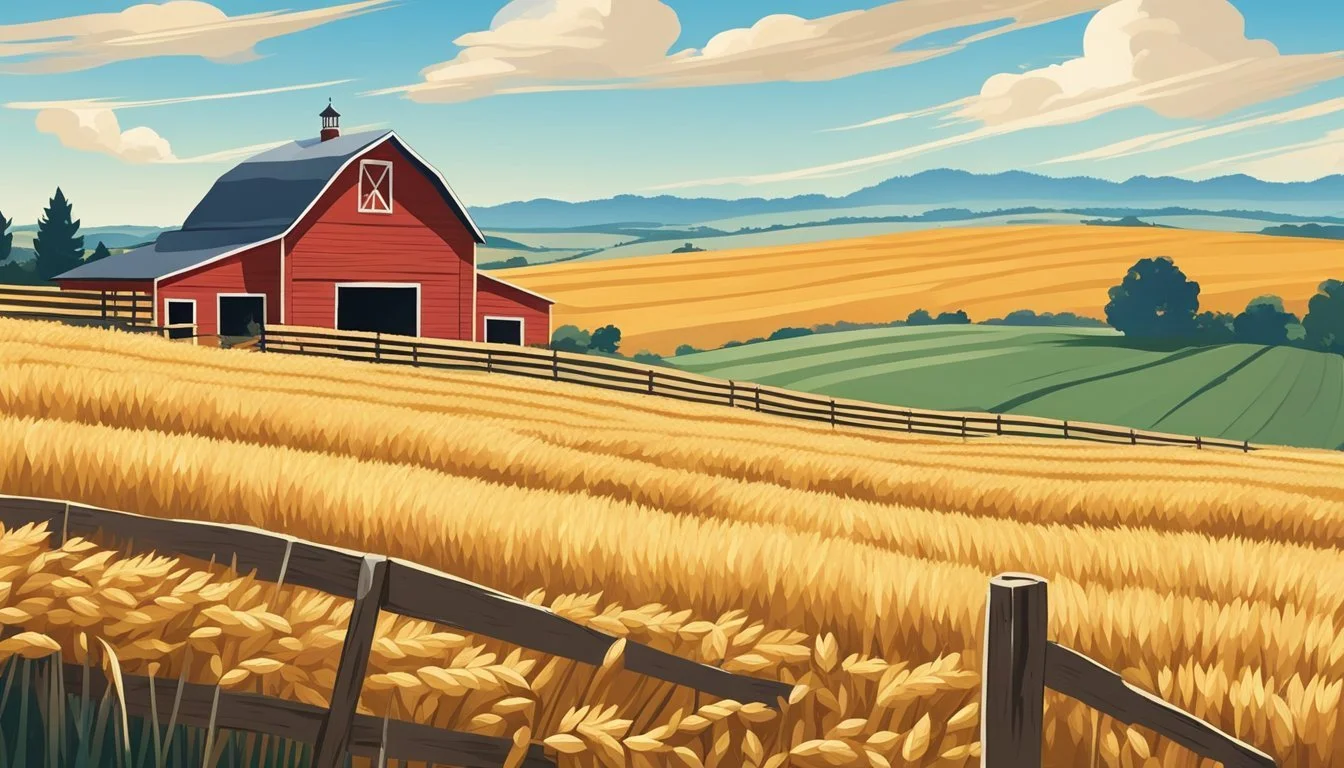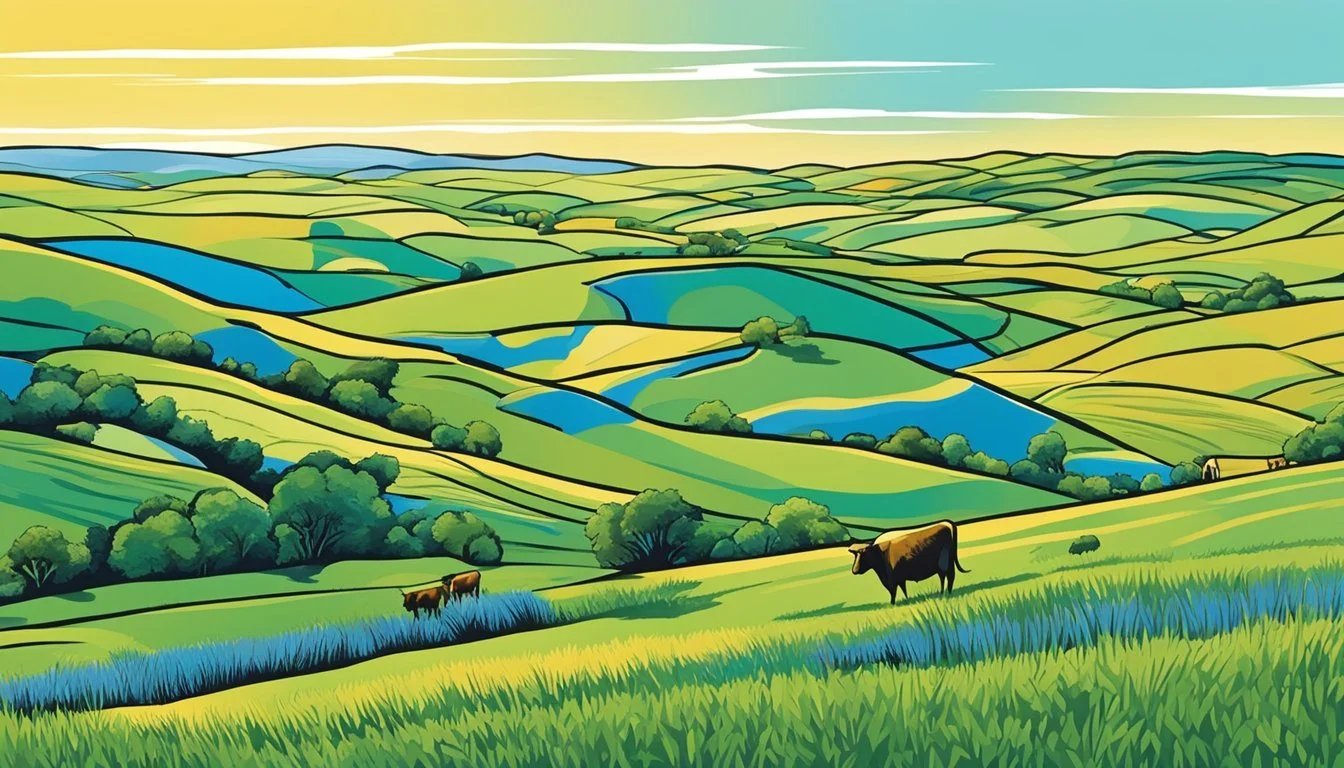North Dakota Farm Land for Lease
Optimal Choices for Agricultural Ventures
This Article is Part of Our Guide on Navigating Agricultural Leases Across the US
North Dakota offers ample opportunities for those seeking to lease farm land. With its broad expanses of open land, the state is recognized for its agricultural prowess, contributing significantly to America's production of wheat, soybeans, corn, and more. Those looking to engage in agriculture can find a variety of farm land options available for lease, catering to different farming needs from crop production to livestock ranching.
The leasing of farm land in North Dakota presents a practical alternative to purchasing, allowing for flexibility and reduced capital investment upfront. This can be an attractive option for those new to farming or established farmers looking to expand without the long-term commitment of land ownership. The state's diverse agricultural landscape and climatic conditions support a range of agricultural ventures, which is reflected in the variety of properties available for lease.
Despite the seasonal challenges that may impact Midwest farming, North Dakota's agricultural sector continues to thrive. Prospective lessees are encouraged to carefully examine lease agreements and consider the state's specific agricultural zones to ensure the land meets their farming objectives. Whether for crop farming or livestock, the region's fertile ground provides a solid foundation for both seasoned and aspiring farmers to grow their agricultural endeavors.
Understanding North Dakota Farm Land
North Dakota's farm land is a vast and crucial resource for agriculture, featuring diverse geographical characteristics and profound agricultural significance. Its utilization and management for agricultural pursuits are of great importance to farmers and the regional economy.
Geographical Overview
North Dakota, situated in the upper Midwest, is characterized by its flat to rolling plains and fertile soil ideal for agriculture. Covering more than 70 million acres, North Dakota is divided into various counties, each with its unique land features suitable for different types of farming operations. The state's topography and climatic conditions cater to the cultivation of a range of crops, particularly in areas like the Red River Valley, known for its rich, productive soils.
Primary Land Types in North Dakota:
Prairie Pothole Region
Drift Prairie
The Missouri Plateau
The Red River Valley
Agricultural Significance
Agriculture forms the backbone of North Dakota's economy, with the state being a leader in the production of several crops. The land is known for its high-yielding acres that are conducive to intensive farming. North Dakota stands out for its wheat production, but it also heavily produces corn, soybeans, and pulses, among others.
Leading Crops by Acre:
Wheat
Corn
Soybeans
Sunflowers
Barley (how long does barley last?)
Canola
The availability of farm land for lease in North Dakota allows farmers to scale operations, whether they are looking to expand into new acreage or start new agricultural ventures. The state’s land is sorted into counties, where land values and rental rates can vary. This geographical diversity ensures that there are offerings for a wide range of farming needs and preferences.
Leasing Process and Legal Considerations
Leasing farm land in North Dakota requires understanding both the leasing process and the pertinent legal considerations. These components ensure that agreements are fair, legally binding, and comply with local regulations.
Lease Agreements
A Lease Agreement in North Dakota is a legally binding contract between a landowner and a tenant. The typical content of a farmland lease agreement includes:
Duration: Specifying the lease period and if it renews automatically.
Rent: Terms concerning rent amount and payment frequency.
Division of Expenses: Clarity on how expenses are divided. For instance, crop-share leases might stipulate tenant and landlord share expenses in various proportions (e.g., 50-50, 2/3-1/3, or 75-25).
It's crucial for all parties to clearly outline the responsibilities in the lease. In some cases, North Dakota law allows for changes in lease terms by the landlord at lease expiration, such as converting the lease from annual to month-to-month tenancy.
Property Rights and Regulations
Property Rights and Regulations are central to ensuring that the lease operations are legitimate and that the property is used as intended. Important considerations include:
Property Usage: The agreement must define allowed agricultural activities, such as crop cultivation or livestock grazing.
Tenant and Landlord Rights: Statutes in North Dakota outline the relationship between landlords and tenants, detailing each party’s rights and duties. These include tenure security, access rights, and legal recourse.
Compliance with Law: Farmland leasing must adhere to local regulations, including those specific to agricultural land, ensuring that farm tenancy laws are respected.
Both landlords and tenants are encouraged to seek legal advice or consultation with real estate specialists to navigate these complex processes and regulations effectively.
Economic Aspects of Leasing
In North Dakota, the economic landscape of farmland leasing revolves around current market trends and average lease rates, which are influenced by factors such as land quality, location, and the prevailing agricultural economy.
Market Trends
Market trends show significant variation in leasing structures, with a notable shift in recent years towards crop-share arrangements. Historically, crop-share leases have been prevalent, comprising 57% of the leases, with cash rent at 41%. Recent trends might reflect changes in agricultural economics and risk-sharing preferences between landowners and farmers.
Average Lease Rates
The average lease rates for farmland in North Dakota have exhibited an upward trajectory over the past two decades. From $36 per acre in 2000, rates have climbed to $77 per acre in 2019.
2019: $77/acre
2020-2024: Data suggests rates have continued to rise, though specific figures vary by county and lease type.
The range of lease rates can be broad, reflecting the diverse conditions of land for lease. Land quality, accessibility, and other factors contribute to this range. For instance, certain counties reported a minimum rent of $37.80 per acre and a maximum of $141.00 per acre, with the most frequent rates falling around $40.00 per acre.
Types of Farm Land for Lease
In North Dakota, farm land for lease encompasses a mix of acreage suited for various agricultural pursuits. Prospective lessees can find properties tailored to grain production, livestock grazing, and specialty agricultural operations.
Crop Land
Farm land dedicated to crop production typically consists of arable fields optimized for grains such as wheat, corn, and soybeans. This crop land is prized for its fertile soil, which is often classified by its level of productivity or "class." Leases may specify the number of acres available and can vary significantly, from smaller plots suitable for diversified farming to extensive swathes of land accommodating large-scale operations.
Pasture Land
Pasture land is geared towards livestock, encompassing tracts of land primarily used for grazing animals like cattle, sheep, and horses. These leases often include details on the type of grass or forage available, as well as the carrying capacity, which is the number of animals the land can support without overgrazing. The acreage of pasture land for lease typically ranges based on livestock needs and the size of the herds.
Specialized Farms
Leases for specialized farms reflect the diverse nature of North Dakota's agriculture, including horticulture, organic farming, and specialty crop production. These farms often come with unique features—such as greenhouses, orchards, or vineyards—and may provide specialized infrastructure tailored to the agricultural focus of the lease, be it a specific crop or farming practice. The acreage for these farms varies, with some being relatively small to support intensive, niche markets, and others requiring more land for diverse crop rotation and management practices.
Finding Land to Lease
When searching for farm land for rent in North Dakota, potential renters have several reliable methods at their disposal. These avenues range from online databases specifically tailored to agricultural land leases to local real estate agencies that specialize in such properties. Personal networks within the farming community can also yield fruitful opportunities.
Online Listings
Online platforms make the search for farm land to rent more accessible than ever. Websites like LandSearch and LandCashin provide listings where individuals can browse available land for lease. These sites often include details such as acreage, location, and contact information for the landowners or agents. Filters allow users to narrow their search to North Dakota, helping to locate plots of Crop Farm Land catered to their needs.
Local Real Estate Agencies
Real estate agencies in North Dakota that specialize in farmlands are invaluable resources. These agencies are staffed by professionals knowledgeable about the state's agricultural real estate market. They can assist in finding land that suits a renter's specifications, budget, and intended use. Members of these agencies often have extensive networks, providing clients with access to listings that may not be publicly advertised.
Networking with Local Farmers
Developing relationships with local farmers can lead to leasing opportunities that are not listed on public platforms. Interacting with community members at local events or joining farming associations can be a strategic move. Local farmers may have, or be aware of, available land for lease or may be considering leasing out part of their own land but have yet to advertise. Networking within these circles can give renters a competitive edge in the farm lease market.
Best Practices in Farm Leasing
When entering into a farm lease, it is crucial for both the landowner and tenant to prioritize clear communication and mutual understanding of the agreement's terms. The lease should reflect a balance of the needs of both parties, with careful consideration of the land's agricultural capacity and real estate norms.
Negotiating Lease Terms
In North Dakota, as elsewhere, negotiating the terms of a farm lease requires careful attention to detail and foresight. Leases should be documented in writing and include specifics such as:
Duration of the Lease: Commonly a year, aligning with agricultural cycles.
Rental Rate: May be a fixed amount, a percentage of yield, or a combination.
Payment Schedule: Rent might be due annually, semi-annually, or following the harvest.
Land Use Permissions: Clearly state what agricultural activities are permitted.
Improvements and Maintenance: Define responsibilities for each party.
A lessee and lessor must agree on how the property can be used, specifying whether it's for crop cultivation, livestock, or other agricultural practices. An informed approach to these negotiations can be guided by research from institutions such as NDSU, which provides insights into local agricultural real estate trends and leasing standards.
Maintaining the Land
The sustainability of agricultural land is paramount. Maintenance clauses in a lease protect the property's long-term viability and the interests of both parties. Essential points include:
Soil Fertility: Both parties should address maintaining or improving soil health.
Repairs: Specify responsibility for repairs to buildings, fences, and other structures.
Conservation Practices: Encourage or mandate soil-conservation techniques.
Inspection Intervals: Regular inspections ensure compliance with lease terms.
Lease agreements may include stipulations for the landowner to access the property for inspections. Such practices help in ensuring that the land is maintained according to the lease's standards, which can also be endorsed by agricultural experts and real estate professionals.
Additional Considerations
When entering into a farm land lease in North Dakota, landlords and tenants must pay close attention to insurance requirements and the specifics of renewal and termination clauses. These elements are critical for protecting both parties' interests and ensuring the lease terms are clearly understood.
Insurance Requirements
Landlords should specify the types of insurance they require tenants to carry. This often includes:
Liability Insurance: to protect against any injuries occurring on the property.
Crop Insurance: if the tenant is responsible for farming operations.
Tenants should verify that the required insurance policies are within their financial means before signing the lease.
Renewal and Termination Clauses
Lease renewal terms should be set out explicitly, including:
Required notice period for renewal.
Any change in terms from the original lease upon renewal.
Termination clauses need to detail:
Conditions under which either party may terminate the lease.
Notice period required for termination.
Responsibilities of each party upon termination, such as land restoration or removal of equipment.
It's imperative that both parties fully understand and agree upon these clauses to avoid potential disputes.
Support and Resources
In North Dakota, farmers seeking to lease land for agricultural purposes have access to a variety of state-specific programs and educational resources. These resources are designed to assist both seasoned and emerging farmers in navigating the complexities of land leases.
State-Specific Programs
North Dakota offers several programs administered by the North Dakota Department of Trust Lands. They conduct surface land lease auctions, offering competitive opportunities for both new and experienced farmers to lease farm land. The department ensures that participants are over 18 and treats all applicants equally, with no preference to former or current lessees. Details on upcoming auctions, lease terms, and relevant contacts for potential violations are typically made available on their website.
Educational Resources by NDSU
The North Dakota State University (NDSU) provides substantial resources to educate individuals on farm leasing. NDSU has developed guides that inform members on land values, leasing rates, and agricultural law. Farmers can benefit from the annual North Dakota County Rents & Prices Survey, which offers a wealth of data regarding local land lease rates. Additionally, NDSU releases publications and conducts workshops aimed at both landowners and tenants to ensure they are well-informed about the leasing process, legal obligations, and best practices in land stewardship.
Conclusion
In North Dakota, farmland leasing serves as a dynamic and essential component of the agricultural economy. The leasing market has displayed adaptability, responding to the shifts in agricultural conditions with flexibility for both landowners and farmers.
Recent trends show that North Dakota's farmland rental rates have experienced a substantial increase over the past decades. From 2000 to 2019, rates have climbed from an average of $36 per acre to $77 per acre. This increment reflects the steady demand and the critical role farmland plays in the state's agricultural output.
The following table provides a glimpse of the recent leasing condition:
Year Average Rental Rate Per Acre 2019 $77
However, while land values have seen double-digit gains, rental rate increases have been more moderate. The year-on-year change from 2021 to 2022 was around 3.1%, despite a 10.9% increase in land values. Such data indicates the rent growth rate is not always consistent with land value appreciation.
Leasing farmland in North Dakota offers opportunities for both landlords and tenants. Landlords can generate income from their land assets, and tenants can acquire the land they need without the substantial capital investment required for purchasing. This symbiotic relationship fosters a robust agricultural sector well-adjusted to the challenges and opportunities of modern farming.







